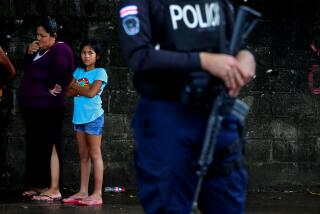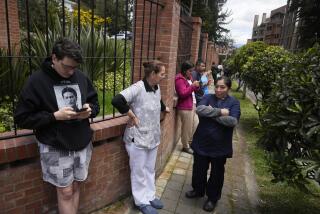Colombia Confirms Bomb Killed 111 on Plane : Terrorism: Cocaine traffickers are suspected in the Nov. 24 explosion.
- Share via
BOGOTA, Colombia — A bomb explosion in the passenger cabin of a domestic jetliner caused a crash last week near Bogota that killed 111 people, Colombian authorities reported Tuesday.
Confirmation of sabotage in the disaster strengthened suspicions of a terrorist attack by ruthless Colombian drug traffickers.
“Evidence indicating the detonation of an explosive device aboard the craft has been confirmed,” said Yezid Castano, Colombia’s chief of civil aviation.
Castano told a press conference at the Bogota airport that the bomb apparently was placed under a seat close to the fuel tanks of the Boeing 727. He said the blast ruptured a tank, and the fuel exploded almost immediately, destroying the plane.
The jet, operated by the Colombian airline Avianca, had taken off about five minutes earlier on an early morning shuttle flight to Cali, Colombia’s third-largest city.
Although Castano said investigators are still trying to determine what materials the bomb contained, a police source said it was made with more than two pounds of plastic explosive.
Castano declined to speculate on who may have planned the attack. Francisco Santos, an editor of the Bogota newspaper El Tiempo, said powerful cocaine traffickers are the prime suspects.
“The thing is, who else?” Santos said.
In late August, drug lords who call themselves the “Extraditables” declared “total and absolute war” on the government and others who oppose them. The declaration promised retaliation for a government crackdown that included a decree allowing extradition of accused traffickers to the United States.
Since then, authorities have blamed traffickers for more than 200 bomb explosions that have killed nearly 30 people. The Extraditables, known to include kingpins of the so-called Medellin drug cartel, have claimed responsibility for many of the attacks.
The cartel’s two top leaders, Pablo Escobar and Gonzalo Rodriguez Gacha, also have been charged with numerous killings over the past decade, including assassinations of government ministers, judges, high police officials and politicians.
Tuesday in Medellin, gunmen in two cars shot and killed Judge Bernardo Jaramillo Uribe, who had been investigating the August assassination of Medellin’s police chief.
After the Nov. 27 airplane crash, a man telephoned the Caracol radio station in Bogota and said the Extraditables planted a bomb on the plane to kill five sapos. Sapo, Spanish for toad, is a slang term for an informer.
At the time, Colombian authorities and news media gave the call slight consideration because no proof of an explosion had emerged and no other messages or evidence pointed to traffickers. More attention was paid to the possibility of a mechanical failure in the 26-year-old plane.
Specialists from the U.S. Federal Aviation Administration, the FBI, and the National Transportation Safety Board have participated in the task force investigating the crash.
Monday night, the task force drafted a secret report that was obtained by the newspaper El Espectador and published Tuesday. The report cited “unmistakeable evidence of the use of an explosive device in the passenger cabin, possibly on the floor area in the vicinity of seat 15F.”
Castano, the civil aeronautics chief, said evidence of a bomb explosion includes impact scars from debris that hit the cabin’s interior at high velocity, and signs that heavy concussion from inside the cabin forced the emergency door near seat 15F.
A revolver found at the crash site may have been in the passenger cabin but apparently played no part in the crash, he said.
He confirmed earlier reports that two men, using the names Alberto Prieto and Julio Santodomingo, had specifically asked to sit together on row 15. Castano said Santodomingo did not board the plane but returned to the check-in counter and gave back his boarding pass.
“It is presumed that the other person traveled, because there is no evidence of his return,” Castano said. He said police and judicial investigators are trying to find out more about the two men.
The passenger and crew lists for the flight contained 107 names, but investigators found 111 bodies at the site, near the Bogota suburb of Soacha. Castano said he could not confirm speculation that the four additional people were killed on the ground.
Castano acknowledged flaws in Bogota airport security, including metal detectors and baggage X-ray machines that sometimes do not work for lack of imported parts. But he said authorities will “spare no efforts” to improve security.
In Washington, U.S. counterterrorism officials said that while they have no direct evidence, they strongly suspect that the Avianca bomb was planted by Colombian drug traffickers in a terror campaign design to stop Bogota’s crackdown on the cartels.
Times staff writers Doug Jehl, Robin Wright and Ronald Ostrow, in Washington, contributed to this story.
More to Read
Sign up for Essential California
The most important California stories and recommendations in your inbox every morning.
You may occasionally receive promotional content from the Los Angeles Times.













